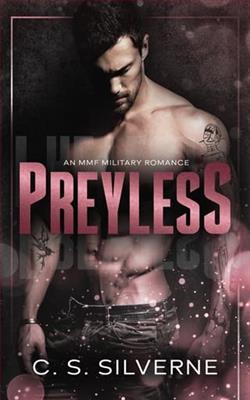Page 452 of Rosetti Family New York
"You know their work?" Rebecca's eyes sparkle. "Are you familiar with the contemporary Italian exhibition opening next week?"
"The Moretti collection? I've been studying his evolution from classical techniques to abstract expressionism." I fall into step beside her entourage, noting expensive suits moving through the crowds nearby. But this is O'Hare—designer clothing is practically the uniform. "His use of negative space in the later pieces completely redefines traditional composition."
"You absolutely must come to the preview," Rebecca continues as we walk. "I know several collectors who would love to meet someone with your expertise."
"I'd be honored."
We reach the taxi stand, and I wave goodbye to Rebecca's group. The cab ride to Wicker Park passes in a blur of city lights and anticipation. Outside the window, a dark sedan maintains the same distance behind us for three turns, but Chicago traffic isfull of black cars going the same direction. I'm seeing patterns where none exist—classic Rosetti paranoia.
The studio apartment in Wicker Park is gloriously cramped. I trail my fingers over secondhand furniture and mismatched dishes like they're Venetian glass.
"This is mine," I announce to the empty room, then laugh at myself. But it's true—every square foot belongs to me alone. I chose the chipped coffee mug. I decided on the threadbare couch. These tiny decisions feel revolutionary after a lifetime of curated perfection.
I spin in the center of the room, arms outstretched. The Rosetti mansion has thirty-seven rooms, but this studio feels infinite because it's actually mine.
When darkness falls and silence fills my tiny kingdom, something unexpected creeps in. I've never been truly alone before—no family voices filtering through walls, no constant hum of presence. The quiet presses against my eardrums like water.
I shake off the feeling. Tomorrow I'll build connections I choose, not ones assigned by blood.
My phone buzzes with missed calls—Dom, Dad, probably that Van person. I silence it without listening to the voicemails. Tonight belongs to me.
The next afternoon, I arrive at the River North gallery fifteen minutes early, portfolio tucked under my arm. Through the glassdoors, I can see two people inside—Rebecca, who recommended me, and a man whose crossed arms and skeptical expression suggest he's less than thrilled about this interview.
"Carmela!" Rebecca greets me warmly. "This is Omar Saleh, our senior gallery manager. Omar, this is the young woman I told you about."
Omar Saleh looks like he's been personally offended by the concept of happiness. Mid-forties, wearing all black, with the kind of carefully maintained scowl that suggests he practices it in mirrors. He gives me a once-over that clearly says "nepotism hire."
"Another collector's daughter who thinks she understands art?" His voice could freeze champagne. "How refreshing."
Rebecca shoots him a warning look, but I actually laugh—a bright, genuine sound that seems to startle him.
"Oh, you're absolutely right to be skeptical!" I say, setting my portfolio on the pristine glass desk. "I'm sure you get tons of trust fund babies who think knowing which fork to use at a gallery opening qualifies them to work here."
Omar blinks, clearly not expecting agreement.
"But here's the thing," I continue, pulling out my documentation. "I wrote my thesis on the intersection of trauma and beauty in post-war Italian sculpture. I've been corresponding with Alessandro Moretti about his upcoming exhibition for six months—in Italian, which I'm fluent in. And Ican tell you're standing in front of the Brennan piece specifically because you don't want me to notice the water damage in the corner that you haven't had restored yet."
Both their heads whip toward the painting behind Omar. There is, indeed, a tiny area of bubbling in the lower left corner.
"How did you—" Omar starts.
"The way the light hits it from this angle. Plus, you've positioned that sculpture to draw the eye away." I move closer to the painting, my excitement genuine. "It's from his blue period, right? 2018? The water damage actually adds interesting texture to the piece—almost like the artist's commentary on impermanence."
Omar's scowl softens by exactly one degree. "You think damage adds value?"
"I think art isn't static. It lives, breathes, changes. Sometimes what we call damage is just the piece continuing its conversation with the world." I turn back to him, unable to contain my enthusiasm. "Like the Venus de Milo—would she be as powerful with arms? Or is her damage part of what makes her eternal?"
"That's… actually not a terrible point." Omar sounds physically pained to admit it.
"Omar has been with us for fifteen years," Rebecca interjects. "He has exacting standards."
"Good!" I say brightly. "I'd rather work for someone who cares too much than too little. Even if you do look like someone forced you to eat swords for breakfast."
The comment escapes before I can stop it—the kind of thing that would horrify my mother. But Omar's mouth twitches. Not quite a smile, but close.
"I don't eat breakfast," he says flatly. "Happiness before noon is suspicious."
"Then you'll love this," I say, pulling out my phone. "I've been cataloging the progression of natural light through the gallery space at different times of day. Look—at 3 PM, the western light hits the Castellano installation in a way that completely transforms the shadows. But at 10 AM, it's the Nakamura watercolors that come alive."















